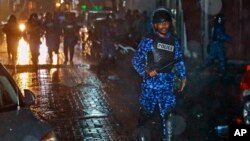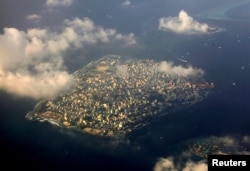China has waded into a growing political crisis involving the small island nation of Maldives, urging the international community to play what it calls a “constructive role” in the ongoing dispute, putting itself at odds with the United Nations on the issue.
The Maldives, which is known more for its luxury resorts, has become an increasingly important part of China’s global trade and infrastructure project, the "Belt and Road" initiative. It is also seen by analysts as a key strategic outpost in the Indian Ocean, despite its close proximity to India.
Earlier this month, Maldives President Abdulla Yameen declared a state of emergency and ordered the arrest of Supreme Court judges and opposition politicians, a move that critics argue is aimed at silencing opponents of the current administration ahead of elections later this year.
The judges were jailed after issuing a surprise ruling that called for the release of imprisoned opposition politicians. The growing number of arrests has sparked outcries from international rights groups and in a phone call late Thursday, U.S. President Donald Trump and Indian Prime Minister Narendra Modi "expressed concern about the political crisis in the Maldives and the importance of respect for democratic institutions and rule of law,” according to a White House statement.
United Nations Secretary General Antonio Guterres has urged Yameen to end the state of emergency and the U.N. High Commissioner for Human Rights Zeid Ra’ad al-Hussein has called the moves an “all-out assault on democracy.
In a bid to garner international support, the Maldives sent envoys to Pakistan, Saudi Arabia and China this week. According to a Chinese Foreign Ministry statement Friday, the country’s economic development minister, Mohamed Saeed, met with Foreign Minister Wang Yi in Beijing on Thursday.
China stresses non-interference
According to the statement, Wang Yi told the official that China believes the Maldives government and people have the "wisdom and ability to appropriately handle the issue facing them and return the country to normal order in accordance with the law."
And in a remark apparently aimed at the growing international chorus and the United Nations against the Maldives government’s actions, he also said: "China does not interfere in the Maldives' internal affairs, which is also an important criterion of the rules of the United Nations charter."
Wang added that China has provided selfless aid to the country.
Wang did not elaborate, but former Maldives president Mohamed Nasheed has said that Beijing has assumed more than 70 percent of the island nation’s debt and that nearly a quarter of the country’s current budget is used to cover interest payments. Similar comments about Chinese loans and indebtedness have come from political leaders in Sri Lanka, another island nation that Beijing is funding in the hope of gaining more access to the Indian Ocean.
Over the past year, the Maldives’ government has put its support behind China’s trillion-dollar global trade and infrastructure project, the “Belt and Road” initiative, signed a free trade agreement with Beijing and Chinese companies are involved a number of projects there, including the expansion of the Male airport.
Strategic value
In addition to growing economic ties, there is a strategic element that is also important.
China opened its first overseas military base, or as it calls them “logistic hub,” in Djibouti last year and there have been credible reports, analysts note, that more are on the way. According to reports, a base is under serious consideration near Gwadar Port in Pakistan, and another along the east coast of Africa, notes David Brewster, a senior analyst with the National Security College at Australian National University.
“That would then leave, if China wished to have a serious presence covering the Indian Ocean, it would also require another naval and or airbase in the eastern or central Indian Ocean and the most realistic places for that to be located are either in Sri Lanka or the Maldives,” he said.
But, while Beijing has significant economic interests in Maldives and strategic goals as well, the island nation is still well within India’s geopolitical orbit. Earlier this week, Nasheed, who has taken up refuge in India, urged New Delhi to send an envoy to the archipelago, "backed by its military." He also asked the United States to "stop all financial transactions of Maldives regime leaders going through U.S. banks."
Brewster said Beijing will be navigating the crisis carefully to keep that from happening and working together with others, including Pakistan and Saudi Arabia.
“Certainly there is no doubt that China will want to see Yameen stay in power and it would be in China’s interests for Yameen not to overstep the mark and do anything to overtly provoke India,” Brewster said. “China certainly does not want to give India any reason to intervene and [for that to] lead to the restoration of democracy.”


